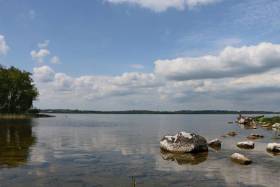Displaying items by tag: River Camlin
IFI Secures Three Prosecutions For Harmful Discharges In Lough Sheelin & River Camlin Catchments
Inland Fisheries Ireland (IFI) has prosecuted three businesses and landowners in the Lough Sheelin and River Camlin catchments between May and September 2019, for the discharge of harmful substances to nearby watercourses.
In June, Kiernan Milling of Granard, Co Longford was convicted in Longford District Court for the discharge of effluent to the River Camlin catchment.
Judge Hughes ordered the payment of €2,441.65 in fines and costs, for breaches under the 1959 Fisheries Consolidation Act.
On 23 July, in Virginia District Court, Mr Patrick Kiernan was convicted and ordered to pay €2,900 in fines and costs, for the discharge of effluent to the Kildorragh River in the Lough Sheelin catchment.
A third conviction was secured by IFI in Virginia District Court in September 2019.
Mr John Lynch, Mountnugent, Co Cavan was ordered to pay €2,500 in fines and costs for allowing the discharge of deleterious matter into the Schoolhouse River, also part of the Lough Sheelin catchment.
In a fourth case in May 2019 at Longford District Court, Judge Hughes disposed of a prosecution by IFI against Mr Derek Moorehead in relation to discharges to a tributary of the Camlin River and ordered Mr Moorehead to pay €500 to a wildlife charity.
Lough Sheelin is a well-known wild brown trout fishery in the Great Western Lakes and one of the most important brown trout angling locations in Ireland, while the River Camlin is an important spawning and nursery location for Lough Ree brown trout.
Amanda Mooney, director of the Shannon River Basin District, said: “Pollution events in the spawning and nursery tributaries along these catchments can threaten indigenous fish populations. The maintenance of the aquatic habitat is vital if we are to sustain and enable wild fish populations to thrive.
“Inland Fisheries Ireland is working to protect and conserve this natural resource to ensure its sustainability into the long term.
“Angling for brown trout in lakes in the Inny catchment and Lough Ree generates important economic activity for rural communities and any impact on fish populations in the area may also have negative impact in this regard.”





























































